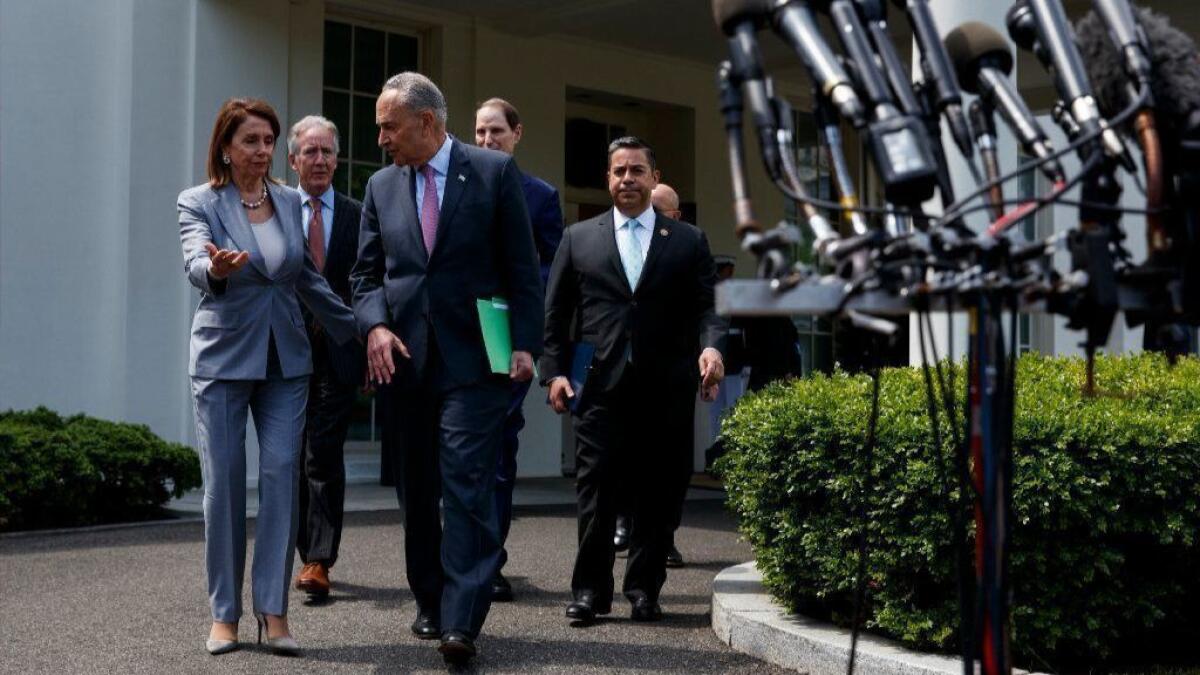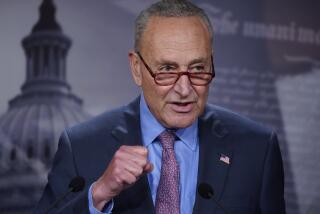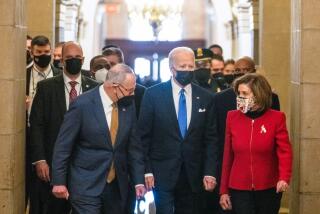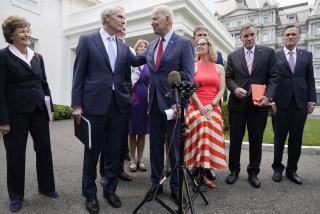Trump and Pelosi both claim progress after infrastructure meeting

Reporting from Washington — There were no TV cameras this time, no accusations of bad faith, or anyone tossing binders or storming out.
Instead, unlike their December and January clashes in the Oval Office, President Trump met Tuesday for 90 minutes with the Democratic leaders he’s dubbed “Chuck and Nancy” in what both sides called a productive discussion about a comprehensive infrastructure package. They even shared Tic Tacs.
When it ended, House Speaker Nancy Pelosi and Senate Minority Leader Charles E. Schumer expressed optimism, not frustration, with the president and announced that participants had agreed to seek a $2-trillion legislative package to repair and improve the nation’s roads, bridges and broadband networks.
“We’re very excited about the conversation we had with the president,” said Pelosi, the San Francisco Democrat. Schumer (D-N.Y.), agreed, calling it a “good and constructive start.”
The White House also seemed pleased, although it did not publicly confirm the $2-trillion price tag and some Republicans were quick to dismiss it. In a statement, Press Secretary Sarah Huckabee Sanders said Trump had “an excellent and productive meeting” with the Democrats.
“We have to invest in this country’s future and bring our infrastructure to a level better than it has ever been before,” she said. “We will have another meeting in three weeks to discuss specific proposals and financing methods.”
The sticky part is figuring out whether the $2 trillion would come from new gas taxes or other means.
“We told the president that we needed his ideas on funding,” said Schumer, who told reporters that Democrats started with a $1-trillion proposal and that Trump had doubled down.
According to a Democratic source at the meeting, Trump even criticized his administration’s past proposals on infrastructure, which relied chiefly on public-private partnerships, not government funds. Those proposals went nowhere.
“That was a Gary [Cohn] bill,” the president said, according to the source, referencing his former economic advisor. “That bill was so stupid.”
Several Republican lawmakers dismissed the $2 trillion as a meaningless sum until it’s clear how it would be raised.
“I’m all for more infrastructure. They could agree to $18 trillion, the question is how to pay for it, and I’m not going to support just borrowing more money. I’m not going to support additional taxes,” said Sen. John Kennedy (R-La.), who chairs a Senate Appropriations subcommittee.
Both Democrats and Republicans acknowledged that they need Trump’s buy-in to move forward.
“If they come to a deal that he’s willing to sign, that will free up certain number of Republicans that want to do this,” said Rep. Tom Cole (R-Okla.). “But you know, you’re not gonna see Republicans proposing major tax increases ... until they know where the president really is.”
That skepticism, despite Tuesday’s rare show of bipartisanship, recognizes not just present realities but painful precedent. Democrats have left meetings with Trump before believing they had reached an agreement only for the president later to claim otherwise.
In 2017, Pelosi and Schumer emerged from a sit-down with Trump and announced they’d agreed on parameters of a major immigration reform package. The deal would include $25 billion for border security measures in exchange for Trump continuing an Obama-era program to defer deportation for so-called Dreamers, people who entered the country illegally as children, but Trump quickly reneged.
Trump, who on Monday sued to prevent Deutsche Bank from responding to Democrats’ subpoenas of his banking records, did not complain during the meeting about the multiple House-led investigations targeting him, according to Pelosi and Schumer.
“In previous meetings, the president has said, ‘If these investigations continue, I can’t work with you,’” Schumer said. He added that in his view, Democrats can work with the president on policy while simultaneously investigating him. “The two are not mutually exclusive and we were glad he didn’t make it that way.”
While the meeting was underway, however, Mick Mulvaney, the acting White House chief of staff, expressed the opposite position, citing the Democratic investigations as a major impediment to legislative cooperation.
“To have an impeachment hearing on Monday, say, and then to think you’re going to talk infrastructure on Tuesday, that’s not how the world works, let alone Washington, D.C.,” Mulvaney said at a conference in Los Angeles.
Pelosi has so far blocked any moves toward impeachment proceedings in the House, so no such hearings are underway or scheduled.
Mulvaney also accused Democrats of meeting with Trump to make it appear that they are more willing to work with the president than they actually are.
“Do I think there’s an interest in doing this? Yes,” he said. “Do I think there’s more interest, especially on the Democrats’ part, to make a show for trying to get a deal? Yeah. I hope conversations go well today but if they don’t, it would not surprise me.”
Unlike rancorous past meetings, Tuesday’s sit-down was open to more than just the three principals.
Trump invited his daughter, Ivanka, along with Transportation Secretary Elaine Chao, economic advisor Larry Kudlow and acting director of the Office of Management and Budget Russell Vought, as well as several other aides. Mulvaney and Treasury Secretary Steven T. Mnuchin were notably absent.
Pelosi brought five Democrats from the House, and Schumer brought five from the Senate. All have a stake in any infrastructure talks with the administration.
Since it will focus on funding mechanisms, the next infrastructure meeting at the White House will no doubt be more difficult than Tuesday’s, although Democrats laid out only three broad principles in a letter to Trump on Monday. It outlined government funding, environmental considerations and Buy American provisions as key priorities.
Rep. Katherine Clark (D-Mass.), vice chairwoman of the House Democratic caucus, said raising the gas tax or rescinding corporate tax cuts granted under the 2017 Republican tax bill are worth considering, but that Democrats weren’t ready to push for any specific funding mechanism yet.
Whether the acrimonious relationship between House Democrats and Trump prevents them from getting an infrastructure package done “is going to be 100% up to the president,” Clark told reporters.
Some Democrats have questioned the political wisdom of working with Trump and potentially giving him a legislative win ahead of his reelection race, but Rep. Hakeem Jeffries (D-N.Y.), who chairs the House Democratic caucus, dismissed that argument.
“The political chips will fall where they may,” he said. “Our job is to get things done. And if we can reach a meaningful bipartisan infrastructure bill that helps fix our crumbling bridges, roads, tunnels, and mass transportation system, that is a win for the American people.”
Times staff writer Jennifer Haberkorn contributed to this report.
More stories from Eli Stokols »
More to Read
Get the L.A. Times Politics newsletter
Deeply reported insights into legislation, politics and policy from Sacramento, Washington and beyond. In your inbox three times per week.
You may occasionally receive promotional content from the Los Angeles Times.












